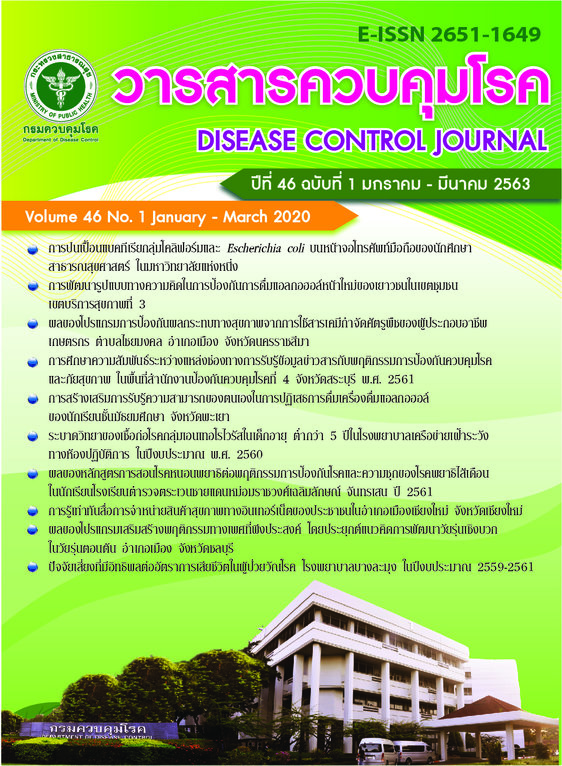Self-efficacy effect on drinking refusal skills of secondary school students in Phayao Province
DOI:
https://doi.org/10.14456/dcj.2020.5Keywords:
alcohol drinking refusal, outcome expectancies, drinking refusal skills, self-efficacy program, Phayao ProvinceAbstract
This study is a quasi–experimental research with one group pre-test post-test design to compare the perceived self-efficacy of refusing to drink alcohol of 65 grade 9 students in the academic year 2016 of a secondary school in Phayao Province. The intervention program was developed based on Bandura’s self-efficacy theory (1997). Data were collected by questionnaires which consist of demographic data, drinking refusal self-efficacy, outcome expectations of drinking refusal, and drinking refusal skills. The scores were analyzed by descriptive statistics and Friedman’s test. The results showed the average score of alcohol drinking refusal, outcome expectancies of drinking refusal and drinking refusal skills has statistically significant difference between pre-intervention, post–intervention and follow-up period scores (p<0.0001).
Downloads
References
World Health Organization. Global status report on alcohol and health 2014. Geneva: World Health Organization; 2014.
National Statistical Office. Survey of smoking and drinking behaviors of the population 2017 [Internet]. 2017 [cited 2018 Dec 21]. Available from: http://www.nso.go.th/sites/2014/DocLib14/News/2561/08-61/N30-08-61-2.pdf (in Thai)
National Statistical Office. Survey of smoking and drinking behaviors of the population 2014 [Internet]. Bangkok: National Statistical Office; 2015 [cited 2018 Dec 21]. 25 p. Available from: http://service.nso.go.th/nso/nsopublish/themes/files/smokePocket57.pdf (in Thai)
Sornpaisan B, Kaewmungkhun J, Wattanaporn K, Nasueb S, Phimpandee W, Phakdasetkul K. Annual report on the situation of alcohol abuse 2010. Nonthaburi: Center for Alcohol Study; 2010. (in Thai)
Muekthong A, Werachattawan N, Vittayanont N. Patient motivation to change behavior and to abstain from alcohol in Songklanagarind hospital. Songkla Med J 2017;35:325-34. (in Thai)
Thammarangsri T. Situation of alcohol consumption and its impact in Thailand 2013. Nonthaburi: Center for Alcohol Study; 2013. (in Thai)
Sornpaisan B, Kaewmungkhun J, Wattanaporn K, Nasueb S, Phimpandee W, Phakdasetkul K. Annual report on the situation of alcohol abuse 2008. Nonthaburi: Center for Alcohol Study; 2008. (in Thai)
Chitsawang S. Relationship between alcohol abuse and crime. Bangkok: Chulalongkorn University; 2008. (in Thai)
Rangphueng A, Chamchanonsuk P, Saengchanthip A. Severe injuries related to motorcycle accident in Thailand, 2012. Weekly Epidemiological Surveillance Report, Thailand 2013; 44:481-84. (in Thai)
Komolpaisan T. The estimation of societal cost of alcohol consumption in Thailand: the development of estimation template. Nonthaburi: Center for Alcohol Study; 2015. (in Thai)
Chaiyasong S, Phakdeesethakul K, Thammarangsri T. Provincial alcohol report 2011. Nonthaburi: Center for Alcohol Studies; 2013. (in Thai)
Bandura A. Self-efficacy: the exercise of control. New York: W.H. Freeman; 1997.
Cochran WG. Sampling techniques. 3rd ed. New York: John Wiley and Sons; 1977.
Kaiyarat P. Effects of incentive programs on self-efficacy to avoid alcoholic beverages of early male adolescents [dissertation]. Chonburi: Burapa University; 2009. 133 p. (in Thai)
Chirawatkun A. Biostatistics for health science research. Khon Kaen: Klungnana Wittaya; 2015. (in Thai)
Young RM, Hasking PA, Oei TP, Loveday W. Validation of the drinking refusal self-efficacy questionnaire-revised in an adolescent sample (DRSEQ-RA). Addict Behav 2007;32:862-8.
Department of Mental Health. Guide to teaching life skills to prevent substance abuse in lower secondary schools. 4th ed. Bangkok: Uranus Image Group; 2001. (in Thai)
Chansaeng S, Ketrat K, Nan-udon R, Komolmalai W, Soonthorn S, Sutheeprasert T Factors relating to alcohol consumption behaviors among secondary school male students in Nonthaburi province. Com Health Dev Quart KKU 2018;6:197-213. (in Thai)
Chowchalard U, Benjakul S, Kengganpanich M, Kengganpanich T. Effects of an alcohol use prevention program applying self efficacy theory among 7th grade students in Nakhon Pathom Province. Rama Nurs J 2018;24:210-24. (in Thai)
Saleengarm W, Rawiworrakul T, Jirapongsuwan A, Sompopcharoen M. Effects of a new drinkers prevention program for primary school students, Surin Province. Journal of The Royal Thai Army Nurses 2019;20:147-56. (in Thai)
Prochaska JO, Velicer WF. The transtheoretical model of health behavior change. Am J Health Promot 1997;12:38-48.
Downloads
Published
How to Cite
Issue
Section
License
Articles published in the Disease Control Journal are considered as academic work, research or analysis of the personal opinion of the authors, not the opinion of the Thailand Department of Disease Control or editorial team. The authors must be responsible for their articles.






